 One of the more challenging things to do in the garden this summer is to repose at complete ease in the Adirondack chair or on one of the rustic benches. The gardener finds this challenging because whenever spending time in the garden or merely passing through, weeding takes place. Whatever purpose brought the gardener outdoors, be it watering new seedlings, having a whack at the grass with the push-reel lawnmower, heading to the garage to wheel out the bicycle for a ride, or intending to take a seat in the sunshine and read a book for a spell, bet the farm on it, weeding will occur.
One of the more challenging things to do in the garden this summer is to repose at complete ease in the Adirondack chair or on one of the rustic benches. The gardener finds this challenging because whenever spending time in the garden or merely passing through, weeding takes place. Whatever purpose brought the gardener outdoors, be it watering new seedlings, having a whack at the grass with the push-reel lawnmower, heading to the garage to wheel out the bicycle for a ride, or intending to take a seat in the sunshine and read a book for a spell, bet the farm on it, weeding will occur. Whatever it is I meant to be doing on exiting the house, and whether sitting still or walking around the yard, my gaze will keep returning to ground level, scouring the borders and woodchip pathways for errant weeds, mostly blades of invasive grasses and the hairy stalks of chicory. My feet will keep tracking these intruders, my body will keep stooping over, my hands reaching to yank out the ungainly offenders. Even with a lovely new novel on my lap approaching its crescendo, or a cup of Darjeeling tea in hand to toast a new morning, my eyes keep getting drawn into examining the ground and the next thing you know, I'm frenetically zigzagging around the garden without plan or pattern, filling my hands with pulled weeds.
In part this is true because the garden is a bit of a ragamuffin. Try as I might to keep it designed, shipshape and neat as a pin, it really doesn't fit this description in any of its quarters. It's blowsy, boisterous, likes to take frequent walks toward the wild side, and very much has an undisciplined and tatterdemalion mind of its own. However many weeds are disgorged and dispatched, there are always more shooting up, sending out branchlettes and explorers in every direction, pitching tents in yet more sections. The weeds grow like, well, weeds, with a wildfire speed and joie de vivre that far surpasses any such characteristics in the cultivated plants. And if one species of weed or wild grass gets successfully eradicated, before you can say Rumpelstiltskin, two or three newcomers of another variety will quickly arrive to replace the banished one.
So far this summer, the weeds (or wildflowers, if you will) identified in this one little garden, in addition to the ubiquitous common lawngrass and little bluestem, include dog fennel, lesser stichwort, milkweed, various types of snakeroot, chicory, hoary alyssum, common mullein, dandelion, yellow wood sorrel and bladder campion. Something the Sleeping Bear Dunes park botanist identified as ground pine, a creeping evergreen, has fanned out its vine-like growth of green needles across about a third of the woodchip-covered back yard. Queen Anne's lace also claims space here and there, maybe having heard on the wild-plant grapevine about the benefits of residing on this little lot, and there are lots of others I don't recognize nor know the names of.
The British garden writer Lewis Gannit aptly summed up a gardener's malady of compulsive weeding. “Gardening is a kind of disease,” he wrote. “When visiting friends for a garden party, you interrupt the serious cocktail drinking because of an irresistible impulse to get up and pull a weed.” Exactly what happens to me in my garden (except, more's the pity, for the serious cocktail drinking), and frankly, I'm a little fed up with myself about it. The realization came upon me, while lunging after yet one more cantankerous rhizome the other day, that not nearly enough time was being spent simply enjoying the garden, or truly relaxing in its presence, or appreciating all its fine and gorgeous cultivated specimens, which do vastly outnumber the scraggly uninvited guests.
Unless one is the happy possessor of a crew of assiduous groundskeepers and a formal, exactingly managed landscape, the fact is that a garden is never going to be perfectly groomed. If it is a healthy garden, it's always going to be kicking over the traces and dashing about in unbridled abandon. It's going to encompass surprise visitors who may be a bit riotous, even slovenly in style, and lacking in self-effacement or deference. A garden with any vitality doesn't know how to demur, and is messy, independent and irrepressible.
And part of the gardener's duty, I've decided, is to stop fretting over the garden's untamed heart, and take pleasure in it. Resolutely raise the eyes from weed level to the blooming flowers and lush, many-colored foliage, to all the keen and gleeful effervescence that is the benefaction of the garden in June. A contented gardener must accept imperfection, and let the correction and addressing of it be kept in the proper time and place, chore time, where it can't encroach upon the hours for simply savoring the bountiful and too fleeting garden goods. Is not that the desideratum of all garden toil?
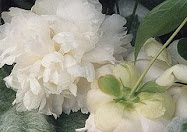


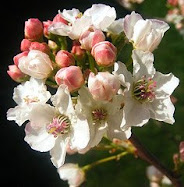
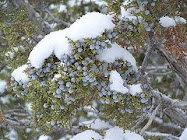

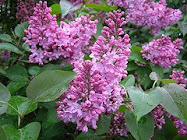
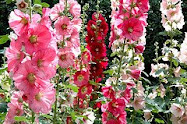
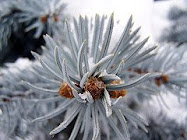
No comments:
Post a Comment